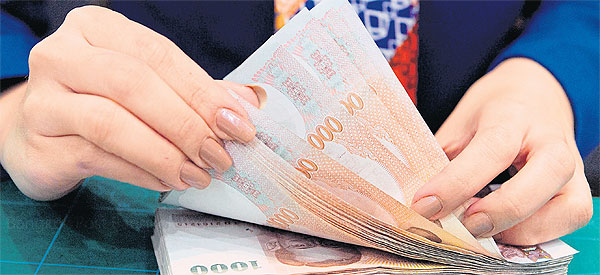
The baht on Tuesday plummeted to its lowest level in nearly six years, while the stock market erased this year's gains as foreign investors shunned local assets on worries over Thailand's economic health.
The currency sank to 33.74/33.79 to the US dollar, extending its loss to nearly 4% since last month. The Stock Exchange of Thailand (SET) index tumbled 1.04% or 15.58 points to close at 1,485.72 in moderate turnover worth 36.3 billion baht.
The main gauge closed 2014 at 1,497.67 points.
"Currencies in Asia have fallen against the dollar, but the magnitude of the baht's pullback is faster and higher than its regional peers," a Thai bank dealer said.
The baht has slipped sharply since the Bank of Thailand's rate-setting committee surprisingly cut its policy rate by a quarter-percentage point for a second straight meeting on April 29.
The central bank described the unexpected cut to 1.5% as harsh medicine to ward off downside risks to growth as exports contracted in the first quarter and public spending faced delays.
Another currency dealer said the baht would remain biased downside and was expected to hit 34 against the dollar soon.

Concerns over Greece's debt payment, the baht's weakness, China's sluggish economic growth and Thai listed companies' earnings also weighed down the stock market's sentiment.
Bank and energy blue chips were at the centre of the sell-off. PTT plunged nine baht to 345, Kasikornbank (KBANK) dropped three baht to 208, Krungthai Bank (KTB) was off 20 satang to 19.80, and Siam Cement (SCC) dipped 12 baht to 526.
Foreign investors yanked 1.2 billion baht out of the market yesterday.
Tisco Securities vice-president Apichat Poobunjirdkul said global factors were largely blamed for yesterday's sharp decline.
China's decision to cut its interest rate for the third time in six months on Sunday reinforced the view that the world's second-largest economy is cooling down and growth could be lower than 7% this year.
Mr Apichat said investors should hold cash and wait until the market becomes more stable.
The downward trend in the stock market is expected to continue this week, but investors can buy selectively when the bourse falls below 1,480 points.
Meanwhile, the SET on Tuesday announced it would modify criteria on the selection of SET50 index and SET100 index constituents by considering trading volume in addition to the current methodology, effective from next month's periodic review.
The SET will also improve the calculation of its total return index from July 1.
Constituents of the SET50 index and SET100 index will be selected from the top 200 stocks in terms of market capitalisation. The stocks' free float must be at least 20%.